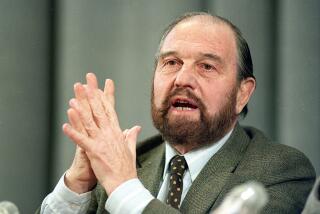Soviets Lost ‘Secret War,’ Ex-Spy Says : Russia: The former head of intelligence compliments German, French, U.S. opponents.
- Share via
MOSCOW — The Soviet Union’s last KGB spymaster acknowledged Friday that Moscow had lost the “secret war” of espionage and paid tribute to German, French and U.S. opponents.
He also credited the services of Iraq and Israel.
Leonid Shebarshin, dismissed as head of the KGB’s intelligence section after last August’s failed coup, said Russians who had spied for Washington were driven by “boundless selfishness and egoism compounded by absence of any strength of will.”
“These people betrayed us, they will betray America,” he told Komsomolskaya Pravda newspaper.
Shebarshin, head of overseas intelligence for more than two years until sacked by former President Mikhail S. Gorbachev, said he regretted the huge cost of the East-West Cold War.
“The secret war was a component of the Cold War. Our side lost that war,” he said. “I hope we draw lessons from that.”
Foreign intelligence work has been taken over by a new Russian service since December’s collapse of the Soviet Union.
Asked which intelligence services had emerged with the most credit from four decades of competition, he replied:
“As far as I am aware nobody ever organized a competition to find the world’s best intelligence service.
“I would rank both German services among those deserving especial respect--Section 1 of the East German secret service, which no longer exists, and West Germany’s BND (Bundesnachrichtendienst)--as well as the French,” he said.
He said that, from a professional point of view, the Iraqis and Israelis had also performed well.
“The United States’ CIA deserves special mention; enormous money, enormous scope, enormous drive--that brings results,” he said.
Shebarshin made no mention of the British secret service, which provided Soviet intelligence with some of its best double agents. Spies such as George Blake, Kim Philby, Guy Burgess and Donald Maclean damaged not only British security but that of its closest allies in the 1950s and 1960s.
More to Read
Sign up for Essential California
The most important California stories and recommendations in your inbox every morning.
You may occasionally receive promotional content from the Los Angeles Times.












